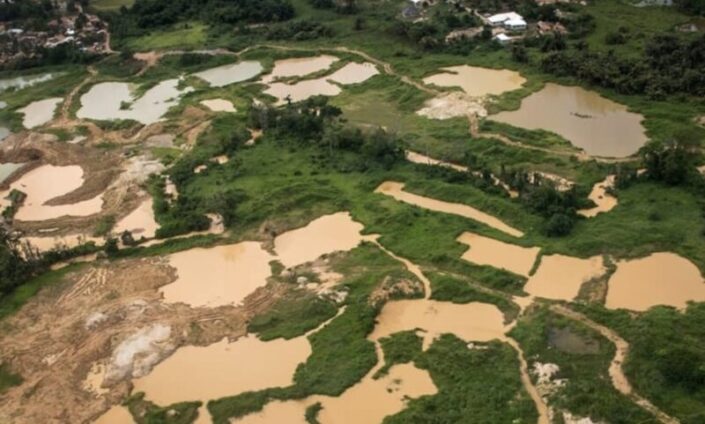The Institute of Statistical, Social, and Economic Research (ISSER) has raised concerns about the environmental impact of Ghana’s gold exports, which now account for over half of the country’s export revenue.
In its latest State of the Ghanaian Economy Report, ISSER calls for urgent steps to evaluate and address these environmental costs to ensure sustainable practices in mining and agriculture, cautioning that failure to act could harm Ghana’s tourism sector.
“Gold exports account for over 50% of export revenue, but there is a need to ascertain the environmental costs and address them to ensure sustainable mining and agricultural practices,” ISSER stated.
The report underscores that while gold mining brings significant revenue, it also presents environmental challenges that could disrupt agriculture and hinder tourism, two other key pillars of Ghana’s economy.
The environmental impact of mining, especially small-scale and illegal mining activities, has become a pressing issue for Ghana, affecting river bodies, farmlands, and forest reserves.
ISSER’s Director, Professor Peter Quartey, highlighted the interconnected risks that unregulated mining poses.
“The effects on tourism cannot be discounted,” he warned, noting that Ghana’s natural landscapes and biodiversity, which attract visitors, are at risk of degradation from unsustainable mining practices.
The report also emphasizes the importance of balancing economic gain from gold exports with environmental sustainability.
“To sustain the benefits of gold exports, we must integrate environmentally conscious practices that will not compromise agriculture or tourism,” ISSER suggests.
The institute’s assessment points to the need for stricter regulatory frameworks and enforcement to curb the negative impact of mining on critical natural resources.
In a bid to protect tourism and agriculture, ISSER recommends that policymakers implement measures to limit mining activities in sensitive areas, such as near water bodies and protected forests.
According to the report, preserving Ghana’s tourism potential is vital for diversification and long-term economic resilience.
“Tourism relies heavily on our natural resources, and if these are compromised by unchecked mining, we stand to lose more than we gain from gold exports,” ISSER cautioned.
Latest Stories
-
Expired rice saga: A ‘best before date’ can be extended – Food and Agriculture Engineer
3 mins -
Why I rejected Range Rover gift from a man – Tiwa Savage
3 mins -
KNUST Engineering College honours Telecel Ghana CEO at Alumni Excellence Awards
37 mins -
Postecoglou backs Bentancur appeal after ‘mistake’
46 mins -
#Manifesto debate: NDC to enact and pass National Climate Law – Prof Klutse
55 mins -
‘Everything a manager could wish for’ – Guardiola signs new deal
1 hour -
TEWU suspends strike after NLC directive, urges swift resolution of grievances
1 hour -
Netflix debuts Grain Media’s explosive film
2 hours -
‘Expired’ rice scandal: FDA is complicit; top officials must be fired – Ablakwa
2 hours -
#TheManifestoDebate: We’ll provide potable water, expand water distribution network – NDC
3 hours -
IPR Ghana@50: Pupils educated to keep the environment clean
3 hours -
PenTrust CEO named ‘Best Pensions CEO’, company wins ‘Scheme Administrator Award’ at Ghana Accountancy & Finance Awards 2024
3 hours -
Alan Kyerematen’s ‘Brighter Future for Health Professionals’ in Ghana Revealed in Bono
3 hours -
#TheManifestoDebate: NPP will ensure a safer, cleaner and greener environment – Dr Kokofu
3 hours -
2024 Election: Police to deal with individuals who will cause trouble – IGP
3 hours

